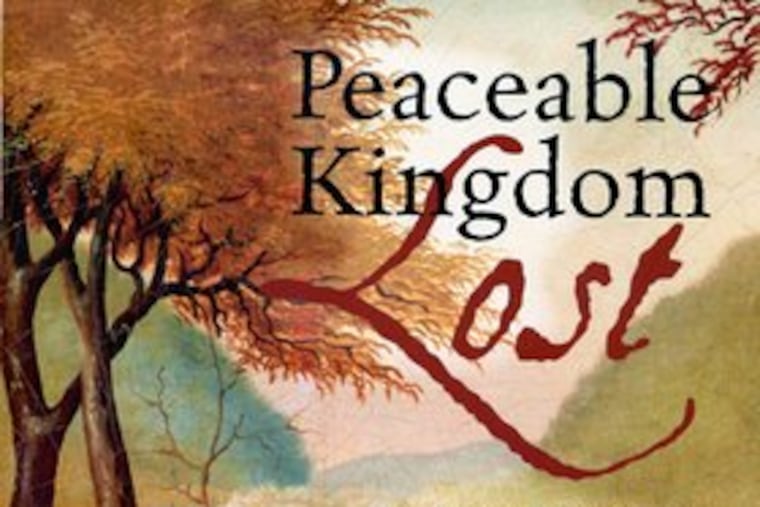Undoing Penn's design
How land-grabbing settlers' murder of Indians set a deadly pattern.

The Paxton Boys and the Destruction
of William Penn's Holy Experiment
By Kevin Kenny
Oxford University Press. 304 pp. $29.95
nolead ends nolead begins
Reviewed by Randall M. Miller
Reading "what-might-have-been" histories is a popular pastime these days. Kevin Kenny implies that a better world might have come had we not lost the "peaceable kingdom" supposedly promised in William Penn's dealings with American Indians but undone by the bloodletting of land-grabbing settlers bent on clearing the frontier of natives.
But Kenny does more than speculate on what might have been had Penn's promise worked as the lodestar of Indian-European relations and colonial settlement.
His account of frontier violence, ethnic and religious rivalries, incompetent and self-destructing government, complicated American Indian alliances, and imperial ambitions in colonial and Revolutionary-era Pennsylvania points to fundamental contradictions in Penn's design - and in those charged with realizing a "peaceable kingdom."
Kenny reveals how self-interest overrode the public good, with hell to pay for all concerned. In that regard, it rings true today as cause and consequence of Pennsylvania's persistent problem - how to cultivate the necessary "common weal" to create a commonwealth.
Kenny begins and ends his absorbing, if dense and sometimes tangled, narrative with accounts of the extralegal violence of the Paxton Boys.
These Ulster Presbyterians from the "frontier" murdered "friendly" Conestoga Indians in December 1763, then marched on Philadelphia early in 1764 to roust other "friendly" Indians under the protection of the Pennsylvania government. They got as far as Germantown before a committee led by Benjamin Franklin persuaded them to give up the march.
During the American Revolution, the Boys ended up taking scalps and seizing land in the Wyoming Valley of northeastern Pennsylvania, raising the flag for the liberty to do what they wanted and take what they could get by threat and force, irrespective of any larger public interest or good.
Such violence, Kenny shows, largely went unpunished and thus begat more violence - the brutal product of an aggressive colonialism that encouraged squatters such as the Paxton Boys to defy authority. The "logic of dispossession," as Kenny calls it, insisted that Indians had no rightful claim to "idle" (that is, uncultivated) land, were by nature treacherous and enemies of Christian order, and needed to be removed at least or eradicated at best under the principle of "right of conquest."
Penn's own interest in orderly settlement and getting good titles to land in order to sell it encouraged him to respect native interests enough to promote peaceful relations and to treat with Indian peoples to acquire explicit claims.
Yet, in the end, Penn undercut his own "peaceable kingdom" because of his need to people his province. Thus came many settlers unto the good land.
In any case, Penn's sons gave up their father's Quakerism to become Anglicans and abandoned his Indian policy. They saw Pennsylvania as a commodity rather than a "holy experiment." The notorious "Walking Purchase Treaty" of 1737, which cheated the Delawares out of a large tract of land that they understood to be theirs by right and agreement, reflected the approach of Penn's heirs.
Neither the Penns nor the settlers wholly controlled events. British policy sought to manage the frontier and its resources by recognizing the "sovereignty" of the Iroquois over other native peoples, and French and British imperial rivalries in the mid-18th century gave natives some advantage in playing one power off against another.
The French and Indian War (1756-1763) brought war directly to Pennsylvania, and unleashed the pent-up frustrations of the Paxton Boys, who resented the Quakers for "coddling" the natives and resisted the authority of anyone or any government standing in their way.
The Indian uprising known as Pontiac's War set the frontier aflame again in 1763. Settlers fled and blamed their suffering on a "Quaker government" unwilling to raise the forces necessary to protect them and on the Penns, more interested in protecting their wealth from taxation than in defending the province from rampaging Indians.
After Franklin and his delegation persuaded the Paxton Boys to give up their march on Philadelphia and express their grievances on paper rather than with violence, a pamphlet war ensued. On one side were the frontiersmen and their supporters, and on the other were the Quakers.
In the freewheeling style of Revolutionary-era pamphleteering, both sides used cartoons and strong words to vilify the "selfish" designs of the other and cast their own position as virtuous, or, at least, anointed by God and common justice.
At issue was "the fundamental question of how Pennsylvania ought to be governed." Ironies abounded. The Quaker party that controlled the Assembly and counted Franklin as an ally wanted the Crown to take over Pennsylvania from the Penns in the interest of order and "liberty."
But, as Kenny makes clear, effective government unraveled, the frontier collapsed into "anarchy," and violence ruled the day.
Kenny claims that the course of events in Pennsylvania set the pattern for America. Any student of English-Indian contacts in plantation Virginia or Puritan New England knows that such a course already had a long history before Penn sought to people his sylvan woods.
That said, this book should remind us how much creating "facts on the ground," to use the more recent example of Bosnia, can defeat ideals and turn practices into policies.
The Pennsylvania experience shows, too, that "ethnic cleansing" and a worldview constricted to an almost tribal self-interest are hardly the exclusive province of the Balkans, the Middle East, or other troubled places beyond America's shores.
One wonders if knowing such histories, here and elsewhere, will free us from them to seek out and build a "peaceable kingdom" for our day.